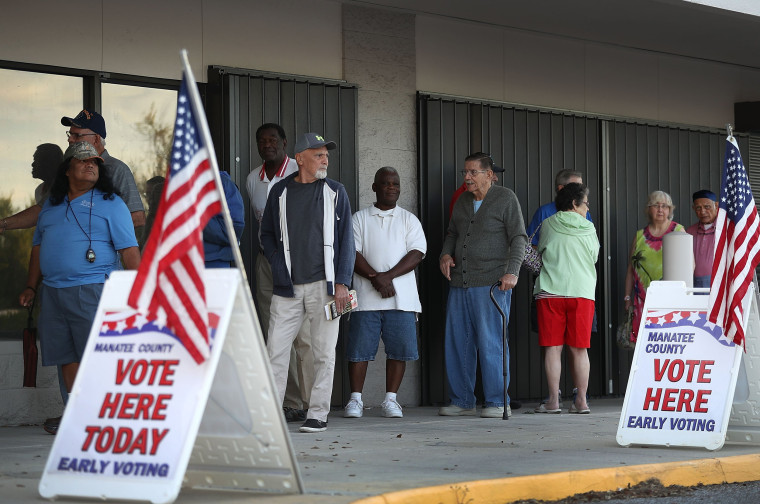CHARLOTTE, N.C. — The most disliked pair of presidential candidates in modern American history are limping towards the finish line amid persistent negativity from voters, and the winning candidate’s reward for victory will almost certainly be a largely pessimistic reception from a mistrustful public.
A focus group of undecided and recently decided voters in Charlotte, North Carolina, on Tuesday night revealed a deeply disillusioned segment of the electorate with little optimism that the next president will bring positive change.
“The message is not ‘vote for me because I’m the best candidate,’” said Gary Nesbitt, a 68-year-old banking consultant who remains undecided. “It’s ‘vote for me because I’m less of a sleazeball than my opponent.’”
Among the focus group of 12 North Carolina voters, which was conducted on behalf of the Annenberg Public Policy Center of the University of Pennsylvania and moderated by Peter Hart, none said that they are confident that the next generation will be better off than their own. And neither presidential choice appeared to address their concerns about America’s future.
Of the 12, five indicated that they were leaning to voting for Clinton, four were leaning towards Trump and the remainder were undecided. But many suggested that their ultimate decision came down to a question of “the lesser of two evils.”
Several members of the group said they were initially inclined to support an outsider candidate like Donald Trump but fear that he doesn’t have the temperament for the job.
“I’m pretty closely decided that it’ll be Hillary,” said Donna Ryan, 57, a retiree who describes herself as a moderate. “I so much wanted Trump, so much wanted a non-politician. But I don’t trust him. And I’m afraid of him.”
“I don’t love Clinton, let me tell you, and I don’t trust her,” she added. “But I think she’s the lesser of two evils.”
Jennifer Meador, a 48 year-old homemaker, agreed. “I wanted to like Trump, but I don’t know that I can, because I think he’s embarrassing [in] the way that he acts,” she said. “I don’t embrace Clinton but if I vote for her it’s probably going to be a vote against Trump.”
Those in the group who said they lean towards Trump tended to cite his professed adherence to Republican Party dogma rather than his own idiosyncratic policy positions.
“I’m leaning slightly towards Trump based on Supreme Court decisions, national security, pro-life. Mainly for what the party stands for, not as much the candidate,” said Denise Houston, a self-employed 57 year-old who identifies as conservative.
Trump’s behavior, even among those inclined to back him, prompted comparisons to a disobedient child. Participants labeled him a “brat,” a “bully” and a “toddler who doesn’t know better."
But if Trump’s temperament was disqualifying for many of these voters, Clinton’s trust issues were almost as salient. In a series of word-association exercises, Clinton was labeled “slimy,” “above the law” and “pinocchio,” and “a liar.”
Sabrina Tucker, a 47 year-old banking analyst who says she is leaning towards Clinton, said that she still has lingering questions about the former secretary of state’s private email server. “She has an excuse for it, but it doesn’t make sense. So it kind of makes you wonder, if you lie about this, what else would you lie about?”
The group’s pessimism about the presidential candidates is reflected in wider public polling of the electorate at large. A recent NBC News/ Wall Street Journal poll showed that 50 percent of voters give Clinton a negative rating, while 40 percent rate her positively. For Trump, less than a third of voters – 29 percent – give him a thumbs up, while 62 percent view him negatively.
Citing Clinton’s long tenure in the public eye and the controversy surrounding her use of a private email server, these voters expressed skepticism that the Democratic nominee can erase the distrust that has haunted her throughout the campaign and much of her time in public life.
“She’s got to avoid any appearance of impropriety, which she’s been unable to do,” said Matthew Carter, 42. “I don’t know how she accomplishes that. Once you’ve lost a trust like that, I don’t even begin to know how you go earning it back.”
Katie Burak, a 30 year-old financial planner who says that either candidate may still be able to win her support, described Clinton’s demeanor as confoundingly lacking in compassion and empathy for others.
“I feel like she’s too well-prepared, too well-spoken that I can’t see her as a human being,” Burak said. “She’s prepared and says what she plans to say, and I don’t see her as relatable.”
Saying that she can’t picture Clinton’s reaction in a crisis, Burak added: “I don’t envision her as motherly or grandmotherly. I just can’t see her relating in difficult situations. [It’s] just when she has time to prepare she can sound good.”
For a woman with 30 years in the public eye, Clinton remains very much opaque, even to some voters who are reluctantly preparing to pull the lever for her.
“I just think she just seems like she has a script,” said Meador. “I don’t think I know her.”

